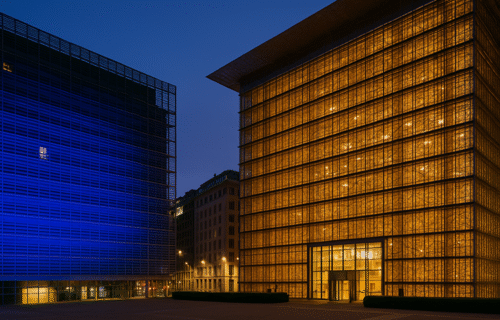Europe’s long-promised financial lifeline for Ukraine ran into trouble this week after Belgium refused to sign off on a €140 billion loan package designed to help Kyiv fund its defence and reconstruction. The impasse at the Brussels summit underscored how difficult it has become for EU governments to balance solidarity with financial caution as the war with Russia grinds on.
The proposal, drafted by the European Commission, would channel funds to Ukraine through a new loan facility guaranteed by profits from Russian state assets frozen at the Euroclear clearing house in Brussels. In theory, the measure would allow Europe to lend without directly seizing Russian holdings — a legal workaround meant to satisfy central-bank lawyers wary of confiscation.
Belgian Prime Minister Bart De Wever said his country could not approve the plan until questions of liability and risk-sharing were resolved. He warned that, as host to most of the frozen assets, Belgium would bear a disproportionate legal burden if Moscow or private claimants launched court action. Other capitals, including Berlin and Vilnius, urged rapid progress but acknowledged that further technical work was needed before the scheme could move forward.
Leaders ultimately watered down their summit conclusions, asking the Commission to present alternative models before the December meeting. Diplomats described the discussion as pragmatic rather than divisive, yet the delay left Ukraine without a clear timetable for the next tranche of large-scale European aid.
Ukrainian President Volodymyr Zelenskyy attended the opening day of the summit, pressing for more air-defence systems, long-range missiles, and economic support as winter approaches. In his remarks, he thanked EU partners for their continued backing but cautioned that any hesitation would embolden the Kremlin. He urged the bloc to find legal and political solutions quickly, describing Ukraine’s struggle as “a fight for Europe’s own security.”
The visit followed what Ukrainian officials described as a difficult meeting with former U.S. President Donald Trump earlier in the week, which heightened Kyiv’s anxiety about wavering Western resolve.
Belgium’s caution reflects deeper unease among several member states about using frozen Russian assets as collateral. Although the European Commission and the G7 have explored mechanisms to harness the interest income from those funds, lawyers fear that any attempt to spend or pledge them could breach international-law protections for sovereign property. Brussels insists the assets would remain immobilised until Russia pays reparations, but even the symbolic step of drawing on related revenues has sparked debate over precedent and exposure.
Behind closed doors, officials also discussed how to structure repayment. Under current drafts, the EU would front the money, using the asset profits as a guarantee, and expect repayment once Russia settles post-war obligations. That legal fiction — lending now, collecting after reparations — still leaves open who bears the risk if Moscow never pays.
The summit’s agenda extended beyond the war. Leaders debated how to set the bloc’s 2040 climate targets, reviewed new export restrictions on advanced technologies bound for China, and considered a further tightening of sanctions on Russian trade. Yet it was the stalled Ukraine loan that dominated corridors and press briefings, symbolising both Europe’s determination and its internal hesitation.
While Germany and most eastern states pushed for urgency, several southern and neutral members backed Belgium’s call for legal caution. The resulting communiqué reiterated “unwavering solidarity” with Ukraine but stopped short of committing to any new funding mechanism.
For Kyiv, the message was mixed. The political backing remains, but the cash — at least for now — is on hold. EU officials will revisit the proposal before year’s end, hoping to bridge legal and political gaps and to show that the bloc can still act decisively under pressure.
As one senior diplomat put it after the meeting, “The unity is real, but the machinery moves slowly.” For Ukraine, facing renewed Russian attacks and a harsh winter ahead, that machinery cannot move fast enough.
Editorial Disclaimer: This article is for informational and analytical purposes only. CIJ.World verifies all facts at the time of writing and maintains strict neutrality on policy outcomes.
